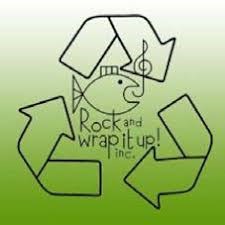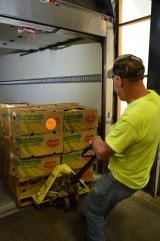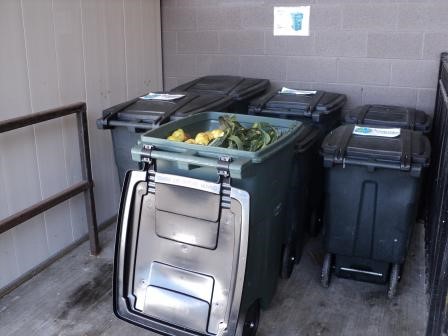| EPA Recognizes New York Food Recovery Challenge Award Winners Making Significant Progress Reducing Food Waste Contact: Tayler Covington, covington.tayler@epa.gov, (212) 637-3662 NEW YORK (April 23, 2020) – Today, The U.S. Environmental Protection Agency (EPA) recognizes the exceptional accomplishments of three New York businesses and organizations participating in EPA's Food Recovery Challenge. Rock and Wrap It Up!, the Golub Corporation, and Wegmans Food Markets applied innovative approaches and engaged in a variety of practical cost-effective actions and best practices to prevent and reduce food waste. "Food Recovery Challenge participants are leaders in showing how preventing food waste and diverting excess wholesome food to people is an environmental win and a cost-saving business decision," said EPA Administrator Andrew Wheeler. "Their accomplishments serve as excellent examples to other companies, governments, organizations and communities." "The Food Recovery Challenge recognizes outstanding accomplishments in food waste prevention and diversion, sustainability, and environmental stewardship," said EPA Regional Administrator Pete Lopez. "These sustainability-focused organizations are increasing awareness about food waste issues and, especially in times of crisis, setting the standard for others to pursue the goal of not wasting food and feeding people, not landfills." Food is a valuable resource. Efforts to reduce food waste and ensure excess food doesn't go to waste are needed now more than ever. The innovation these businesses are showcasing can also serve as an example as the nation works together to address the COVID-19 public health emergency. Over 1,000 businesses, governments and organizations participated in EPA's Food Recovery Challenge in 2019. Participants prevented or diverted over 815,000 tons of food from entering landfills or incinerators, saving participants up to $42.3 million in avoided landfill tipping fees. This year's winners used innovative best practices to prevent and reduce food waste, such as: - Expanding composting infrastructure to more than double yearly food waste composted,
- Creatively working with food banks and organizations to donate food that would otherwise be wasted,
- Repurposing wholesome food into new dishes instead of letting it go to waste, and
- Initiating programs that encourage composting and reducing food waste in the workplace.
| Rock and Wrap It Up! (RWU!) (Cedarhurst, NY) RWU! identifies potential donor organizations who have wholesome, surplus food and pairs them with local food rescue services. Currently, RWU! works with musical bands, educational institutions, the hospitality industry, sports teams, hospitals, and TV/film shoots throughout North America. In 2018, its participating entities donated over 145,000 pounds of food and estimates that its donors rescue at least 20 million pounds of food nationwide each year. RWU! also created a new project called the Andy Parise Veterans' Toolkit, a searchable app that allows veterans to find food pantries, colleges and educational institutions that will serve them donated food in all 50 states. Syd Mandelbaum, Founder and CEO of RWU! says of his work, "One man gathers what another man spills." |  | | The Golub Corporation (Price Chopper, Market 32, Market Bistro) (Schenectady, NY) The Golub Corporation's Fresh Recovery program engages over 13,000 store teammates to collect tons of non-saleable, but edible, fresh food for Feeding America food banks, providing millions of meals to those in need. Food salvage and produce spoils are also donated to local farmers for use as animal feed. In 2018, Price Chopper and Market 32 stores donated 1,728 tons of food, prevented 16,193 tons of food waste, and produced 5,756 tons of compost, totaling 23,677 tons of food waste diversion from landfills - a 14 percent improvement over 2017. "We're proud that our entire team is engaged in efforts to combat food waste and feed our hungry neighbors," said Pam Cerrone, Director of Community Relations. "And it's good to see quantitative evidence that our efforts are paying off." |  | | Wegmans Food Market (Rochester, NY) | |  | Following the EPA Food Recovery Hierarchy, Wegmans first minimizes food waste at the source by using imperfect produce in its culinary operations. Next, unsaleable perishable food items are picked up at Wegmans stores throughout the week by local food pantries and food banks and distributed to those who are in need. Finally, food scraps are diverted from landfills by offering them as feed for local livestock. Finally, food scraps are sent for anaerobic digestion to be turned into energy or for composting. In 2018, 98 Wegmans stores diverted more than 28,896 tons of food waste through its diversion programs, which included donating 10,161 tons of food and composting 18,735 tons. | | "We have programs in place at all our stores aimed at minimizing waste, but when we reviewed those programs five years ago, we knew we could do more. In 2016, we piloted enhancements to our existing programs at our Canandaigua, NY store, and by the end of 2018, rolled those enhancements out to 21 stores. We've seen how helping our employees understand the programs, why they're in place, their importance, and how they benefit the environment, community, and the company, increases our success," said Wegmans Packaging and Sustainability Manager Jason Wadsworth. "We've also learned the importance of focusing on one major area. As part of our bigger goal to reduce all waste, we're concentrating on food waste reduction, where we can make the most significant change, not only for what's ending up in the landfills, but for our communities as well." | Background Food waste is the single largest type of waste thrown away each year in our daily trash. In 2017, more than 40 million tons of food waste was generated. Food waste adversely impacts the economy, our communities and the environment by wasting the resources used to grow and transport food. At the same time, approximately 11 percent of America's households had difficulty providing enough food for all of their family members in 2018. Hungry people in need would benefit from the redirection of nutritious, wholesome food that would have otherwise been thrown away. The strategies used by Food Recovery Challenge organizations, plus those implemented by individuals, communities and public-private partnerships help to lessen these impacts and bring the United States closer to meeting the national goal to reduce food waste by 50 percent by the year 2030. Two award winners this year, MGM Resorts International and Sprouts Farmers Market, are also U.S. Food Loss and Waste 2030 Champions, a group of businesses and organizations who have publicly committed to reduce food loss and waste by 50 percent in their own operations by the year 2030. For more information on the Food Recovery Challenge national and regional award winners, visit: https://www.epa.gov/sustainable-management-food/food-recovery-challenge-results-and-award-winners For more information on the national food loss and waste reduction goal, visit: https://www.epa.gov/sustainable-management-food/call-action-stakeholders-united-states-food-loss-waste-2030-reduction For more information on the U.S. Food Loss and Waste 2030 Champions, visit: https://www.epa.gov/sustainable-management-food/united-states-food-loss-and-waste-2030-champions Follow EPA Region 2 on Twitter and visit our Facebook page. 20-025 # # #
   | |
0 comments:
Post a Comment